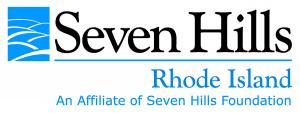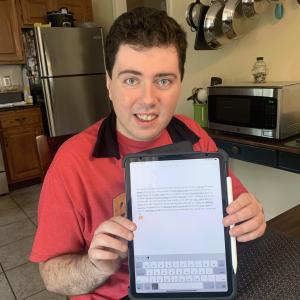Assistive Technology Greatest Asset for People with Developmental Disabilities
Gaining Independence in Their Lives, Connecting with People Within Their Communities
WOONSOCKET, RHODE ISLAND, USA, June 5, 2024 /EINPresswire.com/ -- A technical grant provided by the RI Department of Behavioral Healthcare, Developmental Disabilities and Hospitals (BHDDH) has helped to provide technology to people with intellectual and developmental disabilities (I/DD, with mobile devices opening the door to enormous benefits, from communication to independence. Beyond entertainment, tablets, smart phones, and other mobile devices can bring life-changing opportunities for those who understand how to use them. Realizing this, Seven Hills of Rhode Island capitalized on the idea of using Assistive Technology and committed to training its staff and changing its culture.A team of approximately 75 people participated in TechShift First, a first-of-its-kind curriculum and accreditation process that promotes a Technology First culture. That approach is essential to helping people with disabilities live their most independent, productive lives possible.
Melissa Charpentier, area director of Seven Hills in Rhode Island, comments “our staff has learned how the technology works to serve our clients’ needs, and how to determine it will work best for each individual. Connecting people with technology empowers them. It bolsters their skills and integrates them into the community. It promotes independence by helping them to organize their daily life, to increases their access to education, and even helps with things like cooking - enabling users to watch videos of recipes and decreases their need for staff prompts.”
Of these solutions Kelsey Orleck, Seven Hills Day Service Coordinator, says, “We immediately see how assistive technology gives people an opportunity to do more for themselves, meaning that we may be doing less for them, while increasing our capacity to serve more people.”
She noted that they enlist technology to help people in residential group homes, in shared living situations, living in their own apartments and those at home with family available to support them.
Since practical application is integral to the training, the questions are extensive, yielding insight into personal preferences, from which room a person spends the most time in, to interests, activities, and food. Kelsey selected Dan, who lives at home. Dan’s dad provides support and worked with Kelsey in assessing Dan’s needs - the first step in the process of enlisting technology to improve the lives of people within the day program.
For Dan, a speech to text technology made an important difference, helping him get “unstuck” while trying to communicate his thoughts. Once he saw his spoken word on a tablet’s screen, he was able to organize his thoughts and express his thoughts and wishes more fully and completely.
Kelsey emphasized, “We look at each person individually to understand their very specific and unique needs. Technology enriches lives and can enable relationships by connecting people with similar interests and needs beyond where they live and regardless of their circumstances.”
Applications for the technology are wide, seemingly limited only by creativity. Kelsey described one gentleman who makes videos to help people understand how he likes to things, how he would like his day to go. “When new staff come on board, they learn quickly and easily how to support this person.”
Enlisting Amazon’s Alexa, for example, has helped one blind gentleman get answers to some common questions - such as what time it is, what the forecast is, and what’s on his schedule for the day – so that he can more independently plan his day for himself. Others who can read, find talk to text applications assist them with their daily tasks and communications.
Clearly, they are thoughtful and resourceful in their use of technology. Kelsey acknowledges, “Anything that will help a person express their wants and needs, express their preferences, their interests, and making connections is something we’re willing to try.” Also, enabling the clients to be outside in the community with staff is integral to the idea of connecting.
Aware of rapid technology advances, Melissa adds an important perspective, “universal design in technology” will be critically important to all of us – something we will also all need to be aware of.” speaking of the entire team.
As Kelsey refers to her conversations with the staff, she simply notes that “the clients want to be understood, heard, and want a place in their community where they feel like they belong just like everybody else. They have the same wants, needs, and desires as anyone else. You know, everybody has something that they can contribute to their community, everybody has a gift that they can offer. And it's our job to kind of pull it out of them and see how we can expand on that.”
Clearly, onsite work using Assistive Technologies is intended to enhance all facets of their clients’ lives, from basic needs to employment to volunteer activities. “We have folks who volunteer doing park cleanups, going to food pantries, and stocking shelves, working at Lowe's. It’s integrated, paid employment. There are a variety of opportunities here. And it's about just finding the right match.”
Listening closely, watching carefully, trying new ideas and technologies, the staff gains understanding about what each person needs, which helps them find that right match. Although Kelsey claims they are still “getting their feet wet,” referring to the use of assistive technology, she sees that its use is becoming more prominent in the communities they serve, which means more people are better connected.
Essentially, BHDDH’s tech grant made the devices available to those who needed them, and the Tech First Shift filled the gap between the hardware and how to make each device useful, tailoring it to individual needs.
At Seven Hills, Kelsey and the staff remain focused on what it takes for people to live their best lives every day.
Debra T Morais
Communication Works Inc.
+1 4012866666
email us here
Legal Disclaimer:
EIN Presswire provides this news content "as is" without warranty of any kind. We do not accept any responsibility or liability for the accuracy, content, images, videos, licenses, completeness, legality, or reliability of the information contained in this article. If you have any complaints or copyright issues related to this article, kindly contact the author above.


